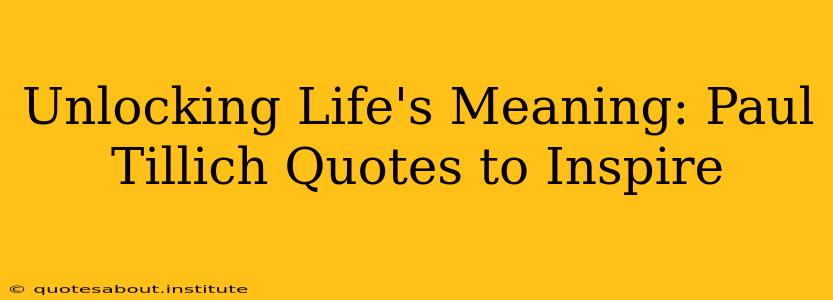Paul Tillich, a towering figure in 20th-century theology, offered profound insights into the human condition and the search for meaning. His work transcends religious boundaries, resonating with anyone grappling with existential questions. This exploration delves into several of his most impactful quotes, examining their relevance to our lives today. Tillich's wisdom, expressed through concise and evocative phrases, continues to offer solace, challenge, and inspiration.
What is the core message of Paul Tillich's theology?
At the heart of Tillich's theology lies the concept of "God beyond God," a paradoxical idea that transcends traditional notions of a personal deity. He argued that God isn't a being among other beings but the ground of being itself – the ultimate source of existence and meaning. This "God beyond God" isn't something we can fully grasp intellectually; rather, it's a reality we encounter through faith and experience. He emphasized the importance of courage in confronting the anxieties and uncertainties of life, and the power of symbols in expressing the inexpressible. Tillich's work strives to bridge the gap between religious faith and modern thought, offering a framework for understanding existence in a secular age.
What are some of Paul Tillich's most important works?
Tillich's prolific output includes several seminal works that have significantly influenced theological discourse. Among his most important contributions are:
- The Courage to Be: This explores the anxieties of modern life and the need for courage to face them.
- Systematic Theology: This comprehensive work lays out his theological system in detail.
- Dynamics of Faith: This focuses on the dynamic nature of faith and its relationship to human existence.
- The Interpretation of History: This explores the role of faith and history in human understanding.
These works, along with numerous essays and lectures, offer a rich tapestry of philosophical and theological reflection that continue to stimulate and provoke.
What did Paul Tillich mean by "the courage to be"?
Tillich's concept of "the courage to be" is central to his philosophy. It doesn't simply refer to physical bravery, but rather to the courage to accept one's existence in its entirety – with its joys, sorrows, anxieties, and uncertainties. It's about embracing the full spectrum of the human experience without succumbing to despair or denial. This courage stems from a profound acceptance of one's finitude and vulnerability, coupled with a faith that transcends the limitations of individual existence. It's the courage to be oneself, flaws and all, in the face of a world that often feels overwhelming.
How does Paul Tillich's theology relate to existentialism?
Tillich's theology shares significant common ground with existentialist thought, particularly in its emphasis on individual experience, freedom, and responsibility. Both acknowledge the anxieties and uncertainties of existence, and the need to confront these realities authentically. However, Tillich differs from some existentialists by grounding his perspective in a theological framework. While acknowledging the human condition's inherent ambiguity, he offers a sense of ultimate meaning and purpose rooted in faith and the "ground of being." This provides a framework for hope and resilience, even in the face of life's inevitable challenges.
How can we apply Paul Tillich's ideas to our daily lives?
Tillich's insights offer a practical guide for navigating the complexities of modern life. By embracing "the courage to be," we can cultivate a more authentic and meaningful existence. This involves:
- Accepting our anxieties: Rather than suppressing or denying our fears, we can acknowledge them and face them with courage.
- Embracing our vulnerability: Recognizing our limitations allows us to connect with others on a deeper level.
- Finding meaning in symbols: Symbols, whether religious or secular, can help us express and understand our experiences.
- Cultivating a sense of faith: This doesn't necessarily mean adhering to a specific religion, but having a trust in something larger than ourselves.
By incorporating these principles into our daily lives, we can unlock a deeper sense of purpose and meaning. Tillich's words serve as a powerful reminder that even in the face of uncertainty, life is a journey worth embracing with courage and faith.
This exploration only scratches the surface of Paul Tillich's vast and complex body of work. His enduring legacy lies in his ability to connect profound theological concepts with the everyday struggles and aspirations of human beings. His words continue to inspire and challenge us to live authentically and find meaning in a world that often feels fragmented and uncertain.

